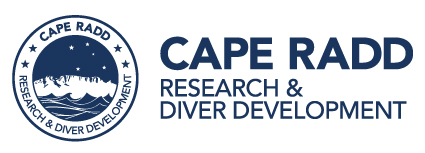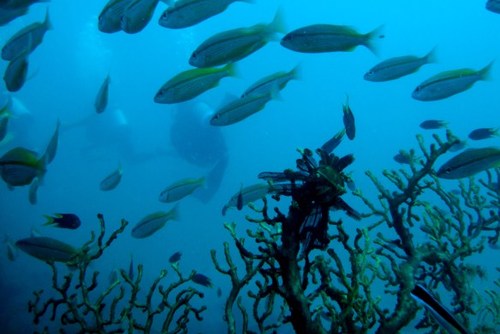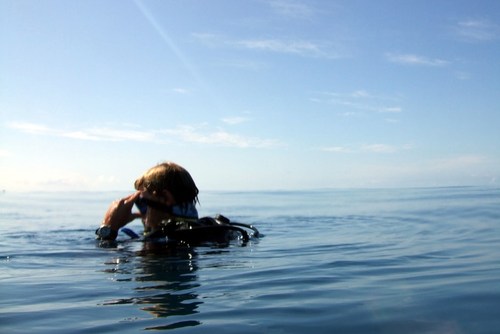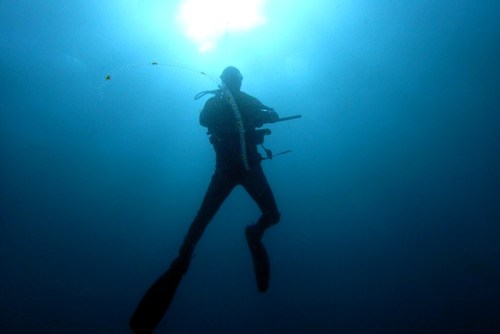We facilitate training courses for individuals or groups who want to learn more about the marine environment, conservation and research through hands on field experience and diver development. Cape RADD courses include training in multiple data collection and field operation techniques, and theoretical workshops and presentations from field biologists and dive experts.
Research projects include species abundance and diversity, kelp forest ecology, and fish and elasmobranch abundance and behaviour. Cape RADD’s research projects aim to culminate in publications in the scientific community and to spread awareness on public platforms in order to promote conservation and share our passion for the marine world.
Location
The Cape RADD headquarters are situated in Simon’s Town, False Bay; nestled in an area of spectacular beauty that features stunning beaches, incredible marine life, and a mountainous backdrop - just 40 km from Cape Town’s city center. Our headquarters are 50 m from Cape Town’s most sheltered dive site, Long Beach, perfect for diver training, and equipment testing.
The coast of South Africa is a well-known hot spot for marine diversity, boasting numerous shark, cetacean, seal and fish species, as well as kelp forests, natural reef systems and artificial habitats in the form of shipwrecks. The biodiversity of the region can be attributed to the oceanographic conditions and habitats created by the meeting of two major ocean currents, the cold Benguela current which travels down the West coast and the warm Agulhas or Mozambique current from the East coast.This location gives us access to both the Atlantic and Indian side of the Cape Peninsula and offers a fantastic variety of habitats and species to observe, study and conserve.
False Bay is one of the most varied and diverse areas in the world for marine life and plays host to an abundance of species large and small, from an eclectic array of colorful nudibranchs, sponges and sea anemone’s to mega-fauna species including the Humpback whale, seven gill sharks and of course the iconic white shark. The False Bay area offers superb dive sites and a mixture of marine habitats from rocky reef, soft corals and wreck diving to kelp forests and off shore blue water diving.
Courses & Programs
As a Cape RADD student you will enroll in a fascinating and hugely rewarding program that will give you a hands on experience and valuable contribution to the marine research projects taking place.
The field training and diver development program gives you an opportunity to be involved with valuable research projects, collecting valuable data and gaining knowledge and understanding of the techniques, methods and challenges experienced in the field whilst working alongside field biologists and dive experts. Throughout this course you will also complete theoretical workshops on subjects relating to your practical training.
As well as your field biologist training and participating in scientific diving collecting data for conservational research projects, you will have the chance to explore and experience the beautiful city of Cape Town and its surroundings, being located only 40 km from the city center, you can climb table mountain, check out the incredible beaches and nature hikes on the Western coast of the city, or just relax at the waterfront marina at one of the many restaurants and bars. A
On the weekends there will be the opportunity to go further afield; maybe take a safari trip to a local game reserve, go on a world famous wine tasting experience in one of the wine regions or visit Robben Island to reflect on African history in the prison where Nelson Mandela was incarcerated for 27 years. There is so much to do and see in Cape Town.
What You Will Do
Here is a sample of what you can expect to gain from taking part in the Cape RADD course:
- Experience in working with field biologists and dive specialists
- Monitoring, experience and understanding of a broad spectrum of research methodologies
- Practical insight into data collection techniques and analysis.
- Comprehensive knowledge of the fish, invertebrates and coral species
- Understanding of threats and challenges to the local marine environment and researchers
- Experience in giving fun and educational conservation presentations – to tourists and local children
- Community outreach participation
- Further PADI dive qualifications, an advantage in Marine Science





